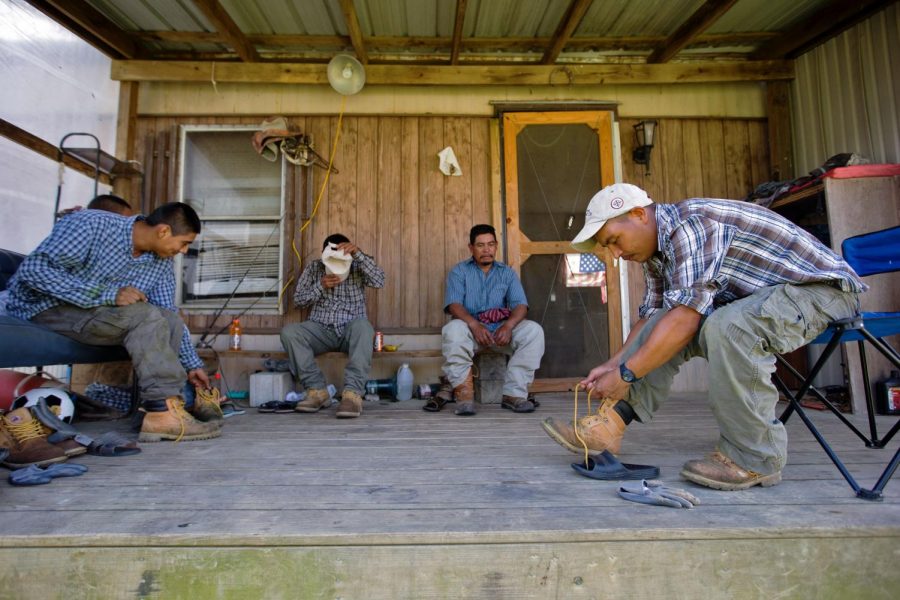72 hours from the ones he loves
February 4, 2015
Life has been nothing short of a long, enduring battle on a path to betterment for Rosalino Santiago Garcia and his family.
The 32-year-old migrant worker from Santa Ana, Oaxaca, Mexico finds himself in Fountain Run, Kentucky, providing for his loved ones nine months of the year, despite being a 72-hour bus ride away from home.
“In my town (Santa Ana), there have been a lot of men that have come asking us to work for them in the tobacco fields,” Santiago said. “I’ve been with this boss for 7 years, but before that I would cross the border illegally.”
Not a day passes when he doesn’t think about his 8-month pregnant wife, Sabina, and his two sons, Leandro and Josue. That’s if he hasn’t already used all the minutes from yet another two-dollar calling card to hear their familiar voices passing through the airwaves from Mexico’s deep south.
A whopping 80 percent of what Garcia makes in the tobacco fields ends up going to his family after a quick phone call and a money transfer.
Santiago’s boss, Al Pedigo, a tobacco and cattle farmer, granted him a two-week break from the field at the beginning of November. Santiago took the time off to visit his family, primarily to be with his wife to welcome the pair’s third child.
After flying from Nashville to Chicago to Houston, Santiago finally arrived in Oaxaca City. His wife and children were a two-hour drive away, yet, he was home. He was in Mexico.
No longer did Santiago have to try his hardest to understand anybody. No longer did he have to remain within the shadows. No longer did he have to miss his country, his wife or his children. He was, after leaving six months ago in May, finally back to a sense of normalcy.
Santiago spent the two weeks cocooned in the comforts of his hometown. He would have never received this experience until February, when his H2A work permit is set to expire and the tobacco harvesting process will be complete.
However, the joy was short lived. The two weeks passed rapidly, and the baby never came.
Santiago headed back north to work in the United States, leaving behind his 21-year-old wife, who will have to enter the birthing room husband-less. No longer does he have the opportunity to walk his son, Leandro, to school. The chance to put his youngest son, Josue, down to sleep disappears.
It’s back to a lonely life separated by more than 2,400 miles of land and a heavily protected border.
But with all the pain at the present, the family knows the payoff to its suffering.
“I believe that any human being in any job they have always places their family first,” Santiago said.
Santiago can gain 12 times as much money working in the United States as he ever could working a similar job in Mexico.
An eight hour workday in Mexico often results in a paycheck of only $12 — not nearly enough to support a growing family.
Although the work in the United States is hard, laborious and often placed in extreme work environments, Santiago can earn $500 a week, $400 of which is sent to Mexico.
It’s the work no American wants to do.
But the Mexicans and other migrant workers welcome the laziness of Americans. Santiago is one of 23 migrant workers on Pedigo’s farm.
Every worker with Pedigo comes from the same pueblo as Santiago — Santa Ana.
Santa Ana feels the effects of its hard-working migrant class. Its economic strength is due in large part to the amount of migrant workers who funnel money they earn abroad back into the community.
Students in the secondary schools can attest to it, too.
Nearly every student, when asked “Who has family working in America?”, raised their hand.
It’s often a father, grandpa, uncle, brother or boyfriend who leave the comfort of Santa Ana to work to better the lives of their family.
There’s nothing different in the case of Santiago, who is optimistic that next year, his eighth in the tobacco fields, will be his last spent away from his family. Santiago’s earnings have already sheltered his young family, and he recently purchased a plot of land where he plans to raise cattle and grow milpa.
Santiago is on the home stretch of his long and enduring battle to betterment, and the day when he is able to stay home for good can’t come soon enough.
“I’m not able to talk with my family often, so I miss them,” Santiago said. “But everything has a sacrifice. Everything you need has a price.”













